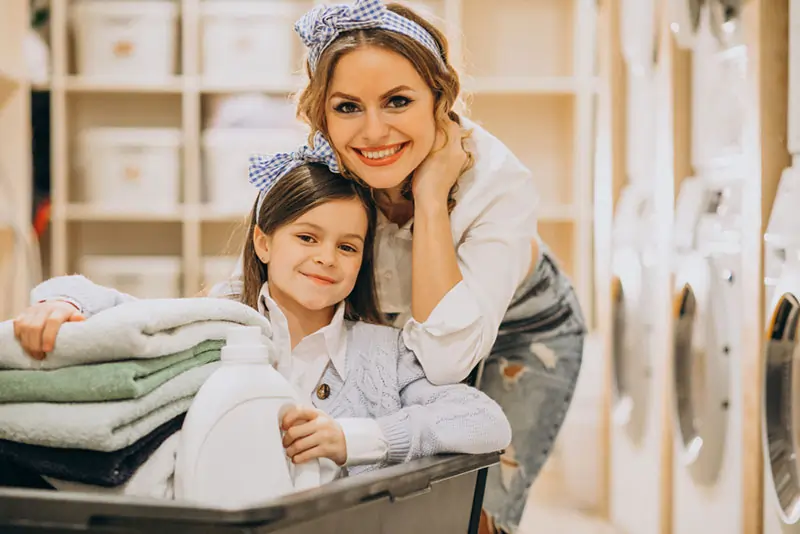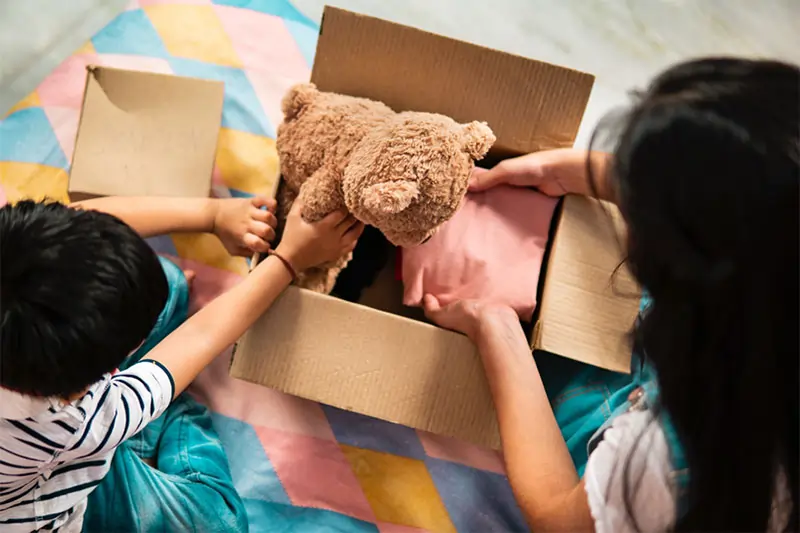What Are Some Eco-Friendly Laundry Options That Are Also Safe For Kids?

As parents, we all make environmentally responsible choices while still ensuring our children’s safety. When doing laundry, this is sometimes difficult because we wade through literally hundreds of products claiming to be both eco-friendly and child-safe. So, what eco-friendly laundry options are also safe for kids?
Indeed, vegetable-based detergents, soap nuts, wool dryer balls, and vinegar as fabric softener will be eco-friendly and kids-friendly. Such alternatives have fewer harsh chemicals that are less harmful to the environment.
While this quick response has been a good starting point, there is much to consider regarding eco-friendly, kids-safe laundry practices. In this article, we delve into each option’s nitty-gritty, their advantages and disadvantages, and all about how you can apply them into practice in your household routine.
How Do Plant-Based Detergents Compare To Traditional Laundry Products?
Plant-based detergents have recently hit the market to be more ‘green’ and friendly to children compared to other products out there for the same purpose. They are manufactured from naturally derived ingredients such as coconut and palm kernel, among other surfactants from plants. In addition to this, plant-based detergents lack many harsh chemicals, synthetic fragrances, and optical brighteners, which may be contained in conventional detergents.
Main advantages of plant-based detergents include: first of all, biodegradability. They could degrade very fast in the environment, unlike the other detergent types, and have less influence on the aquatic ecosystem. Moreover, they are softer on sensitive skin; therefore, they could also be an option for families that may have youngsters in them or when skin allergy problems are at stake.
Not all plant-based detergents are created equal, however. Many will still contain other synthetic additives or preservatives. It is thus very important to read the labels. Also, look for products from reputable organizations that are certified to meet strict environmental and safety standards, such as Tru Earth.
What Are The Benefits Of Using Soap Nuts For Laundry?
Soap nuts, also commonly referred to as soapberries, are a variety of natural, Earth-friendly alternative to these harsh chemical detergents. These little dried fruit shells contain saponin-a naturally occurring surfactant that provides a rather soft sudsing action when mixed with water. Soap nuts are wholly biodegradable, hypoallergic, and soft on the skin of adults and children alike.
One of the best advantages concerning soap nuts is that they are multi-use. They can be used for a variety of loads before they finally end up in compost, thus becoming extremely eco-friendly. All you do is just take a few of the soap nuts, which go in a small, reusable cloth bag, and just throw it in with your laundry-the saponin releases itself during the wash cycle, cleaning your clothes residue-free.
While it is very effective and soft on most ordinary wash loads, soap nuts do not have the power that conventional detergents have when it comes to heavily soiled items or really stubborn stains. It is therefore necessary to pre-treat stains, or they work even better in combination with other natural cleaners such as baking soda or even vinegar.
How Can Vinegar Be Used As A Natural Fabric Softener?
White vinegar is another multi-purpose household product which is rather inexpensive and can easily be used as an efficient, ecologically friendly fabric softener. First of all, one should mention that vinegar is a natural product – it softens fabrics without leaving any irritating residue, while some commercial fabric softeners may contain artificial fragrances along with chemical agents for giving fragrance and smell to the fabrics.
You can bypass fabric softener by adding 1/2 cup of white vinegar to the fabric softener compartment in your washing machine or after the rinse cycle. You don’t have to worry that your clothes are going to smell like vinegar; the smell evaporates as the clothes dry, leaving them fresh and odor-free.
Vinegar has an added advantage of keeping your washer fresh. It helps in preventing soap scum and mineral buildup that could affect the performance of your machine over time. Vinegars should not be used on specified fabrics like silk or leather, because it may damage such fabrics. Always check your garment care labels before trying out any new way of doing your laundry.
What Makes Wool Dryer Balls An Eco-Friendly Alternative To Dryer Sheets?
Wool dryer balls are one brilliant invention that tries to overcome disposable dryer sheets in an eco-friendly way. These reusable balls are usually made of pure wool that separates clothes inside the dryer and allows hot air to pass through with much more ease, which adds to its efficiency. This improved airflow can cut down drying time and hence is capable of saving energy and reducing utility bills.
Unlike most traditional dryer sheets, wool dryer balls do not contain synthetic fragrances and chemicals. They are awesome for families who have kids or for those people that have sensitive skin, as they leave nothing on the clothes that can irritate them. An added advantage is that wool dryer balls can reduce static cling naturally, negating additional use like fabric softeners that have chemicals in them.
The major benefits of wool dryer balls are in their longevity. A good set of wool dryer balls will be long-lasting; it will be able to take hundreds of loads, not single use like many dryer sheets. This is where they save more money while reducing waste. When one appreciates the scent of them on their clothes, it is possible to add essential oils into the wool balls; they can give off a natural fragrance without fake perfumes.
How Can You Make Your Own Eco-Friendly Laundry Detergent At Home?
Creating your laundry detergent at home is a great way to ensure you use eco-friendly and kid-safe ingredients while saving money and avoiding needing pre-packaged detergents or laundry sheets. Homemade detergents typically use simple, natural ingredients that effectively clean clothes without harsh chemicals or artificial fragrances.
A basic homemade recipe for laundry detergent can include the use of washing soda and borax in addition to grated castile soap or even soap flakes. These ingredients, therefore, work in harmony in cleaning, softening, and deodorizing clothes. You can add baking soda to increase the power of cleaning; this makes clothes brighter and deodorizes them by neutralizing odors.
Mix washing soda, borax, and grated soap in equal quantities to make the detergent. Use about 1-2 tablespoons per load, depending on your laundry size and soil. Remember, though all-natural and non-toxic these ingredients may be, homemade detergents should be stored away just like store-bought varieties-out of reach from children and pets.
One of the positives in making your detergent is that you are able to cater it toward your needs. You can add a few drops of essential oils into your detergent, which then gives it a pleasant, natural fragrance. You can also add oxygen bleach to give your whites an extra kick. Just a note to remember: homemade detergents may not clean very dirty clothes quite as well, and those with hard water may need to play with the recipe a little in order to find one that works optimally for their needs.
Taking the First Step Towards Eco-Friendly Laundry
Now that you have all this eco-friendly and kid-safe laundry options knowledge in your pocket, it is high time to act. Choose one of those methods discussed here in the post-be it switching to plant-based detergent or giving wool dryer balls a try. Commit to keeping it for a month. Notice how much of a difference it will make in clothes, in the skin of your family, and just in general with laundry. You will be making one little change, which will take a leap toward an eco-friendlier home, keeping your children safe.

